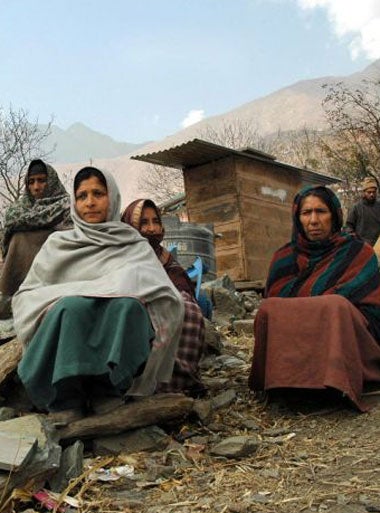IoS Appeal: Cold and fear stalk quake zone
Many of the victims of the South Asia earthquake are now threatened by cold and lack of security in camps. Two weeks ago, the 'IoS' launched its Christmas Appeal to help survivors. Generous readers have already donated more than £64,000. Our chosen charity, ActionAid, will use 75 per cent of your donations for earthquake relief work. The money will be available in Pakistan within days. The rest will go towards disaster-risk reduction worldwide.

Your support helps us to tell the story
From reproductive rights to climate change to Big Tech, The Independent is on the ground when the story is developing. Whether it's investigating the financials of Elon Musk's pro-Trump PAC or producing our latest documentary, 'The A Word', which shines a light on the American women fighting for reproductive rights, we know how important it is to parse out the facts from the messaging.
At such a critical moment in US history, we need reporters on the ground. Your donation allows us to keep sending journalists to speak to both sides of the story.
The Independent is trusted by Americans across the entire political spectrum. And unlike many other quality news outlets, we choose not to lock Americans out of our reporting and analysis with paywalls. We believe quality journalism should be available to everyone, paid for by those who can afford it.
Your support makes all the difference.Abdul Rahman covered his weathered face with his hands and sobbed. Tears are a rarity among survivors of the Pakistan earthquake, but outside a courthouse in Islamabad Abdul finally broke down.
Not only had his home life been destroyed and many of his relatives killed, but he hadn't seen his 13-year-old daughter for nine days after she was kidnapped from a relief camp. "I don't feel like describing this painful thing," he said, wiping his eyes.
A couple of hours earlier, the father of nine was informed that Kulsoom had been found. The suspects were standing nearby in chains and the girl was being checked over in hospital before being reunited with her family. "She was found before she was damaged," said Abdul. "I'm very happy that my daughter was found without being soiled."
Kulsoom was kidnapped at gunpoint with a 20-year-old woman from the capital's sector H-11 relief camp. They had momentarily left their families to go to the toilet. Police eventually traced the pair to a rented house in a village near Gujranwala, about 45 miles from Lahore. One shudders to think what their fate could have been.
But they are not the only ones to have been abducted from Islamabad's tent village for earthquake victims. Three more girls are said to have disappeared since.
By day, the camp appears to be an ordered, if grim, affair, covering 38 acres of land earmarked for a graveyard. Almost 10,000 people - many from Kashmir - share 1,353 tents. The camp is run by the local authority, with help from numerous NGOs. Food and water is provided, and there are shower rooms, toilets, communal areas with televisions, kitchens, free schooling for young children and medical facilities.
Many of the victims are suffering from respiratory problems due to the dust. Children have caught pneumonia because of the cold, and with so many people living in such close proximity, scabies is rife. Since the camp opened, at least six babies have been born.
But despite the relative order, there is much fear. Naseem Fatim, who has lost 65 relatives, shares her tent with four sons and two daughters aged from 11 to 22. "The children are traumatised because their classmates have died," said Naseem, 43, from Chakothi, Kashmir. "They won't go to the toilets alone. We've been here four weeks and we're not happy here ... the main problem is the lack of security for the girls. Everything is related to honour. If a girl is raped or molested, she is dishonoured. My daughters are young, and they are not safe here."
Syed Qaim Ali, 30, who owned a car repair workshop in the Neelam valley in Kashmir, is almost at his wits' end. "It would have been easier if I had died. I wouldn't have to see this pain or have this responsibility," he said. Not only does he have a wife with a broken leg and a three-month-old baby to look after, but he is also responsible for his sister and sister-in-law, who share the couple's tent.
"It's too cold, the tent is so small and the doctors don't visit as much as is needed," he says. "When my wife's plaster is off I'll go and look for work in Islamabad. I feel lost. It will be very difficult to start from zero."
His wife, Saeeda Kaneez, 30, is worried that she will never be able to walk again. With her leg in plaster, she can't leave the tent to shower or use the lavatory. All that the couple possess are two changes of clothes, two mattresses, two pillows, two quilts, a bucket, some cups and plates and dried food. "I don't want to think about everything that I lost - the jewellery, the clothes, the utensils," Saeeda said.
Siddiqa Malik, a volunteer at the camp from the Pakistan Institute for Development Studies and Practices, has been counselling some of the survivors. "They have started to come out of the initial shock," she said. "We are counselling them about how to handle their multiple sorrows. They come from communities where they are self-sufficient. I don't want them to become beggars waiting for outside help. They will be counselled towards the thought that they have suffered a natural calamity and to go back and rebuild their own lives. A big service that the world can do is to build them proper schools and hospitals."
Join our commenting forum
Join thought-provoking conversations, follow other Independent readers and see their replies
Comments